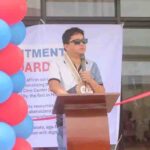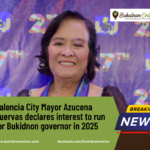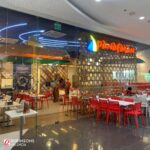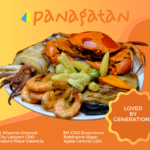Galing Pook Awards conferred to Malaybalay City, Valencia City et al
PRESS RELEASE from the Philippine Information Agency – President Gloria Macapagal-Arroyo led in the presentation of citations for this year’s outstanding local governance programs, in rites held at Malacanang on December 4.
Speaking at the 2009 Galing Pook Awards, President Arroyo appealed to Filipinos to cast aside political differences and relive the Christmas spirit of peace. She exhorted Filipinos to come together during Christmas, and “celebrate faith and family, and pray for the unfortunate.”
“We should be united to bring goodness, not pain, to our communities. We must put aside our differences, be they personal or political, and I say this at a critical time in our nation’s history as we prepare for the elections next year,” President Arroyo said.
Need a place to stay? Book Your Hotel in Bukidnon and anywhere in the world
Need transportation? Book your bus, flight, ferry/boat, train here
YOU CAN ALSO BOOK BY CLICKING BELOW:
Klook.comThis year’s Galing Pook Awardees are composed of five from Mindanao, two from the Visayas and seven from Luzon. The winning programs range from peace and conflict resolution to environment management to health and social services. Each of the project was evaluated for innovation, positive results, transferability and sustainability, people’s participation and efficiency.
The 2009 Galing Pook awardees are Sarangani province; Midsayap, Cotabato; Tabuk, Kalinga; Barangay Luz, Cebu City; Marikina City; Taguig City; Quezon City; Bayawan City; Surallah, South Cotabato; Makati City; Malaybalay City; Barangay Barobo, Valencia City; Bulacan province; and Parañaque City.
The Sarangani province was cited for instituting Kalinaw Sarangani, a program that enjoins different ethno-linguistic groups to take part in peace-building, development planning, decision-making, governance and the formation of 50 peace and development communities. The program involves culture sensitivity practices, livelihood assistance, skills development, infrastructure and other social services.
In Midsayap, Cotabato province, punong barangays or village leaders of Nabalawag, Tugal, Lower Glad, Rangaban, Nes and Mudseng have formed an alliance for peace called the NATULARAN MU Peace Council. These riverside communities, populated by a mix of Christians and Muslims, have established a conflict resolution mechanism. The council acts as peacemaker, mediator, referee, guide, peace and order enforcer, and even endorses community projects. Even with limited time and budget, the council has made great strides in building peaceful lives for their communities.
In Tabuk, Kalinga, the Matagoan Program created a council composed of the head of the Municipal Peace and Order Council and representatives from the eight original sub-tribes of Tabuk. It serves other Kalinga sub-tribes, and immigrants like Ilocanos, Igorots and Tagalogs. The local government had formed the council to settle disputes between tribes and within tribes, to promote the peace pact and to conduct the annual renewal of peace and unity vows. Since then, the Matagoan Program has helped settle 33 of 35 tribal conflict cases. Criminality went down and the improved peace and order has brought a rise in business establishments.
At Barangay Luz, Cebu City, Kuarta sa Basura was initially launched for the community to earn through recycling, composting and other environment-friendly activities. Various sector organizations like the youth, elderly and women’s groups are now so heavily involved in raising awareness, cleaning, segregating, recycling and monitoring their surroundings. The barangay’s total waste disposed in the city landfill is now only 28%, while the rest of the waste is converted to cash through recycling and composting.
In Marikina, consumers in the city can savor their food and water with the assurance of the Clean Food and Water Laboratory project. The city government disseminates information on food safety and hygiene and has required food vendors in public markets to undergo Comprehensive Food Safety and Personal Hygiene training. The project also regularly monitors water and food quality through the city’s own laboratory. Neighboring cities have also begun to avail of the lab’s services. The project is now being replicated by Muntinlupa City.
Taguig City has launched the Taguig Citycard, an ID card system that allows residents to have free or discounted access to various social services, and priority in employment opportunities. By requiring a levy of P750 annually from the private companies for every non-resident employee, the city is able to generate additional revenue for financing its social services. Thus, the city has devised a way of making the rich sector of Taguig help in the provision of social services for the poor. This year, free college education has begun to be offered to Citycard holders. Professional fees for doctors at the Taguig City Hospital are waived. Free funeral services, senior citizen birthday gifts, socialized housing, and other benefits are given to 20,488 Citycard holders. Another 50,000 applications are currently being processed. A high-end memorial park also established a similar facility for poorer clients who are Citycard holders.
Quezon City’s Parks Development and Administration Department has helped transform the city with the development of the La Mesa Eco Park, the CP Garcia Park, North Olympus Park and the Tandang Sora Shrine, among others. The proactive participation of various government entities, NGOs, the private sector and concerned community and church leaders in these projects have helped transform the cityscape. Barangays are empowered to develop parks in a cost-sharing arrangement with the city. Beyond image-building, the parks have helped increase property values, improve the residents’ well-being and promote peace and order.
With the help of the German Technical Cooperation Agency, Bayawan City, Negros Oriental has established an economical and ecologically sustainable system called “Ecosan.” The project basically treats and transforms human waste products appropriate for use as fertilizer and soil conditioner, and for re-use in irrigation, construction and firefighting. Bayawan’s Ecosan project is a breakthrough in the improvement of sanitation programs. It is the country’s first LGU-constructed and managed wetland wastewater treatment facility.
In Surallah, South Cotabato, PARAISO HIMSUG is an acronym for an innovative program that involves the farming community in organic and bio-dynamic agriculture and the production of alternative medicine. In a household, the children and parents together brew Korean Natural Farming and bio-dynamic preparations that are applied to the crops. Ingredients used in the processing of alternative medicine are taken from these organically grown crops. The whole family practically participates together and gains better access to livelihood while improving their health.
In Makati, the Waste Diversion and Reduction Program has greatly reduced the volume of city waste, as much as 84,196 tons of equivalent carbon dioxide. The program increases the income of indigent households by turning in recyclables. The Baratilyo ng Basura sa Barangay involves the Kapisanan ng mga Junkshop Operators sa Makati, which provides logistical support, while the cluster barangay schedules and provides a venue for the event. Residents, stakeholders and civil society organizations actively participate in raising awareness, consultations and dialogues on the program.
The City Government of Malaybalay in Bukidnon tackles inaccuracies in data gathering and city surveys through its Malaybalay Integrated Survey System. Patterned after the DILG’s Community-Based Monitoring System, the survey has 231 questions covering the information needs of the different departments. About 420 barangay health workers and midwives conduct the survey and are tasked to learn the data processing program and work on computers provided to all 46 barangays. The survey covers all the households in the city, providing basic demographics and profiles of households. This gives a better picture of the city’s constituents and their needs, and provides a basis for development and action planning.
In Barangay Barobo, Valencia City, Project BULAWAN uses vermi culture as a means to improve household incomes in this barangay of farm workers. The Barangay Council encouraged members to adopt the system. Vermi worms feed on bio-degradable waste products and in turn produce vermi cast, which is used as organic fertilizer in rice and vegetable production. The project has increased incomes by 40% and freed many from long standing debts. It has also popularized organic farming in the area, and reduced farming production costs as much as 48.5%.
In Bulacan Province, Gawad Dr. Manuel G. Roxas recognizes outstanding achievements in public services of offices and departments of the provincial government. A department or a cluster of departments presents a project to the awards committee. Projects must have community participation and are aligned with the office’s mandate. They must have communication plans and a budget. Executed well, these projects help the provincial government find innovative ways to serve constituents. Twelve winners since the awards were introduced have become regular government programs. The projects also help offices and departments gain feedback and become better attuned to the citizen’s needs.In Parañaque, the Adolescent Friendly Reproductive Health Services (AFRHS) program promotes and provides quality health services responsive to the needs of adolescents. They are involved in planning, implementing and evaluating different interventions. Health centers have a special room for counseling and treating adolescent clients. An integrated referral system was put in place so that they could be cared for by the appropriate social service agency. Peer education to promote healthy lifestyles has been undertaken. As such, the government hopes for a continuing decline in the rate of teenage pregnancy, abortion and sexually transmitted diseases. (PIA 8)







17 thoughts on “Galing Pook Awards conferred to Malaybalay City, Valencia City et al”